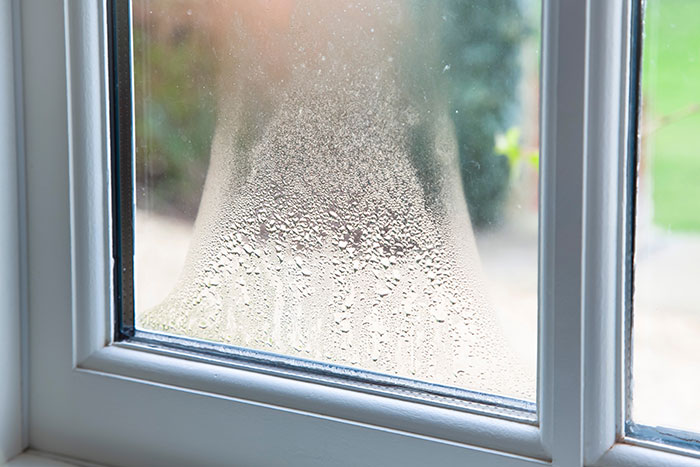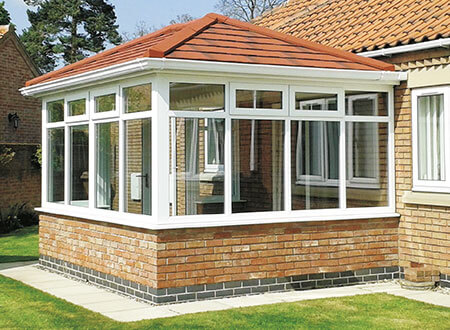
Not only is condensation on and inside double-glazing annoying, but left untreated, it can cause big problems further down the line. But what can you do to avoid unnecessary repair bills?
Is the condensation on the outside or in between the glazing?
Click below depending on whether or not your windows are steamed up on the outside, or between the glazing.
- I have condensation between the glazing
- I have condensation on the outside of the window (inside the home)
Condensation between window glazing
Condensation between double-glazed windows is a common issue that occurs when the seal between the two panes of glass is broken, allowing moisture to get inside. This can happen due to a variety of reasons such as age, temperature changes, and air pressure differences.
Is it a problem?
Condensation between double-paned windows is a problem for several reasons:
- Broken seal: When condensation forms between double-paned windows, it usually means that the seal between the two panes of glass has failed, allowing moisture to get inside. This can lead to further damage and decreased energy efficiency.
- Leads to further damage: Over time, the moisture inside the window can lead to the growth of mould and mildew, which can cause further damage to the window and the surrounding area.
- Decreases energy efficiency: When the seal between the panes of glass is broken, it can allow outside air to enter the space between the windows, reducing their insulation properties and causing the home to lose heat or cool air.
If you notice condensation between your double-paned windows, it’s important to have them inspected by a professional at Plan-it Windows. In most cases, the affected window will need to be replaced in order to prevent further damage and restore energy efficiency.
What causes condensation on windows?
Firstly, condensation can happen all year round, but it’s especially noticeable in the colder winter months. Condensation on window surfaces and condensation inside double-glazing panes happen when cold windows, lower outdoor air temperatures, and warm indoor air collide. This leads to something called ‘the dew point,’ when water vapour condenses and forms water droplets on the surface of the glass. Think of what your bathroom mirror looks like after you’ve had a shower and you’ll get the idea.
Should I worry about condensation on windows?
Condensation on windows is perfectly common, especially on the inside, and if you see it then you shouldn’t be too worried as there are a number of things that you can do to prevent it. However, the worst thing you can do is to leave it as it will eventually heat up and run onto your window seals, which will cause them to start deteriorating. If you have wooden window frames then water from condensation can seep into the wood and cause it to expand and crack.
Wipe condensation off with a microfibre cloth, or for a more high-tech solution, use a window vacuum. If you are getting condensation on the inside of your double glazing then it could mean that your window seals have already started to perish and need replacing. If that happens, give us a call for a free no-obligation quote.
Failed units? Get a free replacement window quote
How do you stop condensation on windows?
There are many different things that you can do to stop condensation on windows, including:
- Get better wall and window insulation
- Ventilate your home better
- Open windows to stop moisture from being trapped
- Keep your heating on all the time, though, this is a very expensive solution
- Don’t dry clothes indoors
- Regularly clean your dryer’s vents
- Open windows and use lids when cooking
- Close internal doors to trap the spread of moisture
- Invest in a humidifier, then…
- …turn your humidifier down!
How to stop condensation on windows overnight?
Stopping condensation on windows overnight is fairly simple. Keep your bedroom door and your curtains open to improve airflow, and keep your window open slightly. If this doesn’t help the situation, inspect your window seals to see if they have become cracked, brittle, or have come away from the window pane causing a gap.
Looking for a home improvement expert?
Home improvements are a big decision, so you’ll need an expert you can trust. From uPVC doors and windows to conservatories with tiled roofs – no matter the job, we’ve got hands-on experience in it all. Whether you’re in Bolton, Bury or the Manchester area, give our team a call and we will give your home the perfect finishing touch.
Our customers are saying great things
Start your project with Plan-it
A committed team of suppliers and installers, we have over 20 years’ worth of expert knowledge and experience in the North West’s residential sector. Plan-it Windows are wholeheartedly dedicated to delivering a jargon free, supportive and tailor-made service to each and every customer.
Start your project
"*" indicates required fields

Fantastic service, replaced all the doors, windows and roofline on our old house and did a great job. High quality and great value. Got them to do the roofline and cladding on our new home and again excellent workmanship and great value. Can’t recommend enough.


 Entrance Door Designer
Entrance Door Designer Download our tiled roofs brochure
Download our tiled roofs brochure